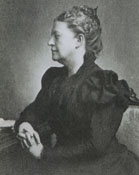 This Goodly Land
This Goodly Land
Zitella Cocke (November 10, 1840–December 3, 1929)

Other Names Used
- Julia Zitella Cocke: full name
Alabama Connections
- Marion, Perry County: birthplace, childhood residence, education, adult residence, place of burial
- Mobile, Mobile County: adult residence
- Gadsden, Etowah County: adult residence
Selected Works
- Cocke, Zitella. A Doric Reed. Boston: Copeland and Day, 1895. An online version of A Doric Reed is available from Internet Archive's American Libraries.
- Cocke, Zitella. The Grasshoppers' Hop: and Other Verses. Boston: Dana Estes, 1901. For younger readers.
- Cocke, Zitella. Cherokee Rose: And Other Southern Poems. Boston: R. G. Badger, the Gorham Press, 1907.
Biographical Information
Zitella Cocke was born and raised in Marion, Ala., on her father’s plantation. Cocke began writing poetry as a child, leaving poems under her mother's breakfast plate. She was a good student and graduated from Judson Female Institute (now Judson College) at age sixteen. In 1856, Cocke traveled to Europe to study music. On her return, she began teaching at Judson, becoming principal of the music department in 1868. After her father’s death in 1867, Cocke assumed responsibility for her mother and her youngest sisters. She began publishing poems in periodicals to supplement her teaching salary. After her sisters were grown and married, Cocke left Marion, writing and teaching music in other towns, including Chicago and Baltimore. She also began writing and publishing musical compositions. In 1890, Cocke moved to Boston to be closer to the publishers located there. She taught music to Harvard University students and did translations of French and German works, many for the Boston Public Library.
Cocke’s poems and essays were published in magazines such as The New England Magazine, Current Literature, Lippincott’s Magazine, and The Reader’s Magazine. Her short stories for children were published in The Youth’s Companion, St. Nicholas, and Harper’s Young People. Cocke published her first book of poems, Doric Reed, in 1895. The Grasshoppers’ Hop, a collection of poems for children, was published in 1901. Cherokee Rose, published in 1907, contained poems on Southern subjects. Cocke’s eyesight began failing in 1916, and she became blind, although she continued to write. In 1918, she moved back to Alabama to live with relatives. Cocke was living in Mobile in 1921 when the Alabama legislature adopted a resolution expressing appreciation for her work. At the time of her death, Cocke was living in Gadsden, Ala., with a niece. She is buried in Marion.
Interests and Themes
Zitella Cocke wrote poems about grief, religion, and nature. She also wrote nonfiction essays, poems and short stories for children, and musical compositions.
For More Information
Please check your local library for these materials. If items are not available locally, your librarian can help you borrow them through the InterLibrary Loan program. Your librarian can also help you find other information about this author.
There may be more information available through the databases in the Alabama Virtual Library. If you are an Alabama citizen, AVL can be used at your public library or school library media center. You can also get a username and password from your librarian to use AVL at home.
Reference Articles
- Beck, Jennifer L. "Zitella Cocke: Alabama's Forgotten Poet". Alabama Heritage 77. (2005): 18-25.
Reference Book Chapters and Encyclopedia Entries
- Williams, Benjamin Buford. "Poetry and Drama"; A Literary History of Alabama: The Nineteenth Century. Rutherford, N.J.: Fairleigh Dickinson University Press, . 131-132.
Reference Web Sites
- Beck, Jennifer. "Zitella Cocke". The Encyclopedia of Alabama. 2009. Alabama Humanities Foundation and Auburn University. http://www.encyclopediaofalabama.org/face/Article.jsp?id=h-2415.
Location of Papers
- Alabama Department of History and Archives
- Judson College, Marion, Ala.
Photo courtesy of the Alabama Department of Archives and History.
Last updated on Sep 18, 2009.